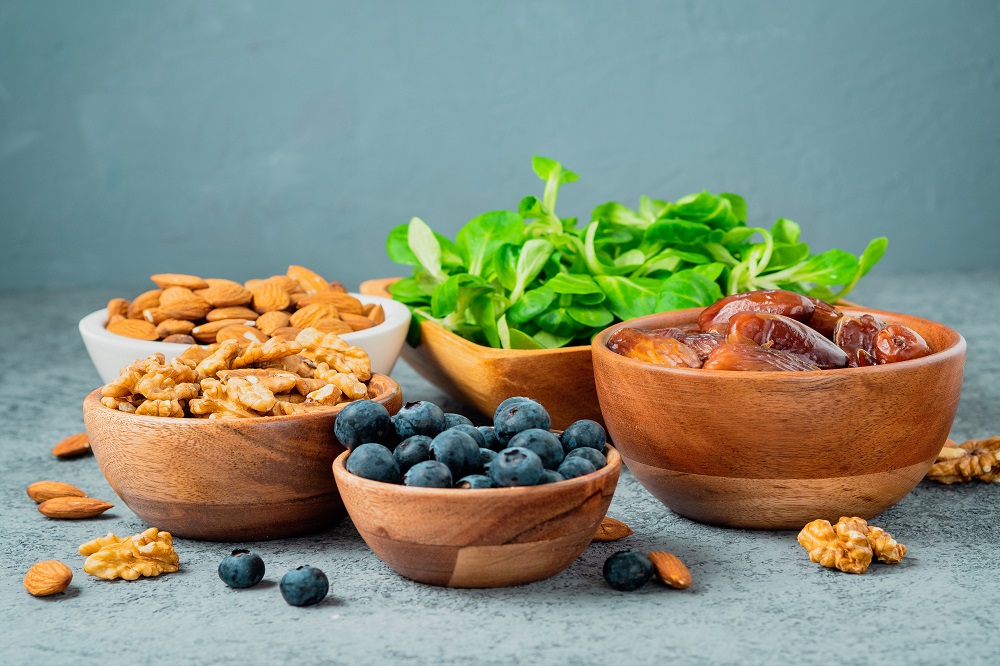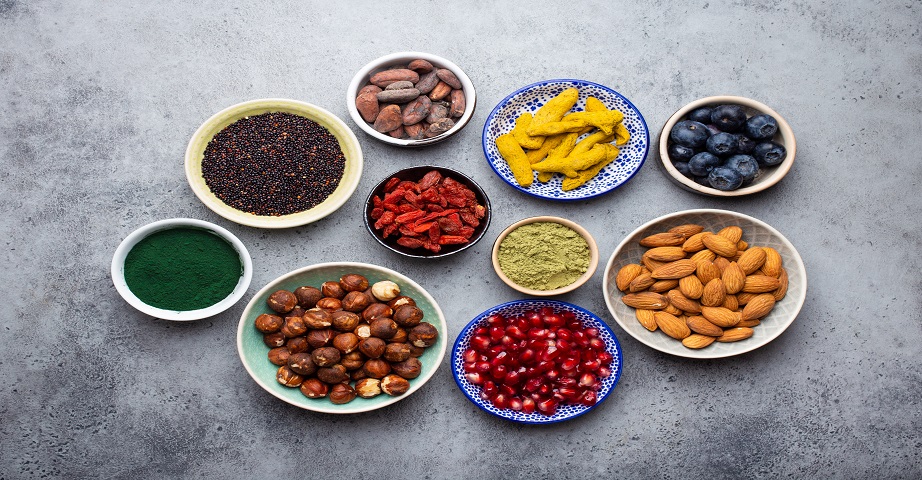Superfoods - what is it? Is it worth using them?

Superfoods, or super foods, are food products that are becoming more and more popular among consumers. And it is not surprising - interest in ecology and a healthy lifestyle is still growing and makes people look for unprocessed products that can comprehensively support the work of the body. Although superfoods are not magical ingredients that will improve your well-being in the blink of an eye and will provide huge amounts of strength and enable weight reduction, they are a natural way to provide the body with significant amounts of valuable substances and nutrients, which can have a positive effect on the functioning of the entire body. What is the definition of superfoods? What products are included in the super food category? Why is it worth including them in your daily diet?
Summary
Superfoods - what is it?
Superfoods is a marketing slogan, a colloquial term for natural, unprocessed food products that are distinguished by high nutritional value, as well as a wealth of valuable ingredients - vitamins, antioxidants or minerals, and their quantity and properties can have a positive effect on the functioning of the human body.
"Superfoods" is a term that was first used by Aaron Moss in 1998 in the journal "Nature Nutrition" and quickly became a popular slogan promoting the topic of healthy eating and a balanced diet. Although today the term "super food" is a commonly used slogan, it is still difficult to find a specific definition of this statement.
Superfoods - properties and effects
The first product to be referred to as superfoods was bananas. They were advertised due to the low price, as well as the fact that they are extremely nutritious. At that time, their availability and natural "packaging" were also praised. Currently, the group of superfoods includes many different foods that contain vitamins, minerals, as well as antioxidants, dietary fibre, enzymes, amino acids and essential unsaturated fatty acids.
Super foods can facilitate the supply of valuable macro-and micronutrients among people who are distinguished by an increased demand for proteins, fats, carbohydrates, as well as vitamins and minerals, and what's more, they can be a great solution for those who are struggling with shortages of valuable and necessary for the proper functioning compounds. In addition, superfoods can have a positive effect on well-being, and due to the presence of antioxidants, they can contribute to the neutralization of free radicals and reactive oxygen species, as well as to reduce oxidative stress and delay aging processes. Superfoods can have a positive effect on the immune, circulatory or nervous system, and according to research analyzes, they can help reduce glycemic levels among people struggling with type II diabetes.
Superfoods and scientific research
Superfoods is a popular slogan in the media and marketing, which still does not appear very often in scientific publications. Scientists and researchers remain incredulously about the concept of superfoods, because the analyzes that focus on health-promoting properties usually concern a specific substance or compound contained in food, not the entire food product. Despite this, it is recognized that the use of superfoods during following a healthy and balanced diet and performing regular physical activity can have a positive effect on the body's work, therefore, it is recommended to include this type of products in the daily menu.
Recommended superfoods
Superfood products - list of the 10 most popular products
The category of superfoods includes various types of products - fruits, vegetables, spices, herbs, as well as algae or fish. In the list of the most popular superfoods you can find products such as:
- Kale - a cruciferous vegetable considered a good source of dietary fibre, as well as vitamins A, E, K and C, folates, calcium and iron. It is a plant that has antioxidant potential and can reduce the risk of digestive disorders.
- Chia seeds - seeds od Salvia hispanica, which are distinguished by a wealth of protein and linolenic acid, as well as magnesium and dietary fibre. Chia seeds can have antioxidant effects and reduce the risk of developing cardiovascular diseases, and what's more, they can have anti-inflammatory properties.
- Goji berries - fruits from the tropical forests of South America, which are a source of calcium, iron, as well as valuable fatty acids, including linoleic and oleic acids. Goji berries can have antioxidant effects and support the work of the immune system.
- Spirulina - algae, which is a source of protein, potassium, iron, as well as vitamins, including vitamins A and K. Spirulina can support the detoxification processes of the body and strengthen the immune system.
- Maca root - cruciferous vegetable from the family of brassicas, which contains antioxidants, as well as B vitamins, iron, calcium or zinc. Maca root can increase resistance to stress, support the process of weight loss, as well as support sexual function.
- Quinoa - a plant from South America called the Golden Inca, which is a source of protein, B vitamins and calcium, iron and phosphorus. Quinoa can facilitate digestion, and can also support the work of the circulatory system.
- Amaranth - a plant from the Amaranthaceae family, which is a source of easily digestible protein and contains all essential amino acids. In addition, it provides the body with B vitamins, vitamin E and also dietary fibre and valuable fatty acids. Amaranth can positively affect the lipid profile and may also have antibacterial properties.
- Avocado - a plant originating from Mexico and Central America, which provides the body with monounsaturated and polyunsaturated fatty acids, as well as vitamins A, C and E and minerals such as manganese, selenium and zinc. Avocado has antioxidant potential, protects the circulatory system and supports the functioning of the nervous system.
- Blueberry - a source of dietary fiber, vitamins C, E and copper and manganese. It is a fruit that can have a beneficial effect on the work of the brain, as well as regulate blood pressure and show anti-diabetic properties.
- Camu camu - a plant originating from tropical areas of South America, which provides the body with significant amounts of vitamin C, as well as dietary fiber, vitamin A, calcium, potassium, zinc or manganese. It is a fruit that supports the work of the immune and circulatory systems.

Polish superfoods - substitute for exotic superfoods
Although the most popular superfoods products are dominated by exotic ingredients that are becoming more and more available on the Polish market, and scientific research suggests that imported food is more often referred to by consumers as super foods, than national substitute, it is worth knowing that on the nearby bazaar, market or even in your own kitchen, you can also find articles called superfoods. The most popular native examples products, called super food:
- Garlic, which contains flavonoid compounds and saponins, as well as B vitamins and numerous elements. It has antibacterial and antifungal properties and strengthens the body's immunity.
- Millet groats - a substitute for amaranth, which does not contain gluten, but it is a source of B vitamins and valuable minerals, including potassium and magnesium. Millet groats can support the work of the brain and nervous system.
- Flaxseed - the local equivalent of chia seeds, which contains significant amounts of omega-3 fatty acids, and is also a source of dietary fibre, vitamin E, potassium, phosphorus and calcium. Flaxseed can support the work of the digestive system, and can also regulate the hormonal balance.
- Pumpkin - a plant from the Cucurbitaceous family, which contains significant amounts of vitamin A, as well as vitamin C and E. Pumpkin is also a great source of potassium and copper, and thus can affect the proper functioning of the muscles and nervous system, as well as maintaining optimal blood pressure.
- Walnuts - the equivalent of macadamia nuts, which is a source of polyunsaturated fatty acids, manganese, copper and B vitamins. Walnuts can reduce the risk of developing cardiovascular disease and may also have antioxidant properties.
- Chokeberry - the equivalent of goji berries, which is a source of vitamin C, B vitamins, as well as calcium, potassium and magnesium. Chokeberry may have antioxidant potential and reduce the risk of developing cardiovascular diseases.
- Beets - a plant from the Amaranthaceae family, which is primarily a source of potassium, manganese and folic acid. Beets also contain flavonoids or betalain. The plant can strengthen blood vessels and have hepatoprotective properties, and can also lower blood pressure.
- Spinach - a plant that provides the body with vitamins, including vitamins C, K and A, as well as dietary fibre, calcium and iron. Spinach is also a source of ingredients with antioxidant properties, and thus can reduce oxidative stress. In addition, the plant can protect the cardiovascular system.
- Nettle - a source of vitamin K, as well as B vitamins, iron, magnesium or potassium. It is a plant that can act diuretic and anti-edematous, and what's more, it can have detoxifying properties.
- Beans - a source of protein, dietary fibre, as well as iron, magnesium and valuable B vitamins. Beans can have a protective effect on the cardiovascular system and can also reduce the risk of developing type II diabetes.
Inclusion of superfoods, both from exotic countries and nearby orchards, for daily diet is a natural way to provide the body with valuable nutrients and can be an excellent solution to supplement the menu with valuable compounds.

